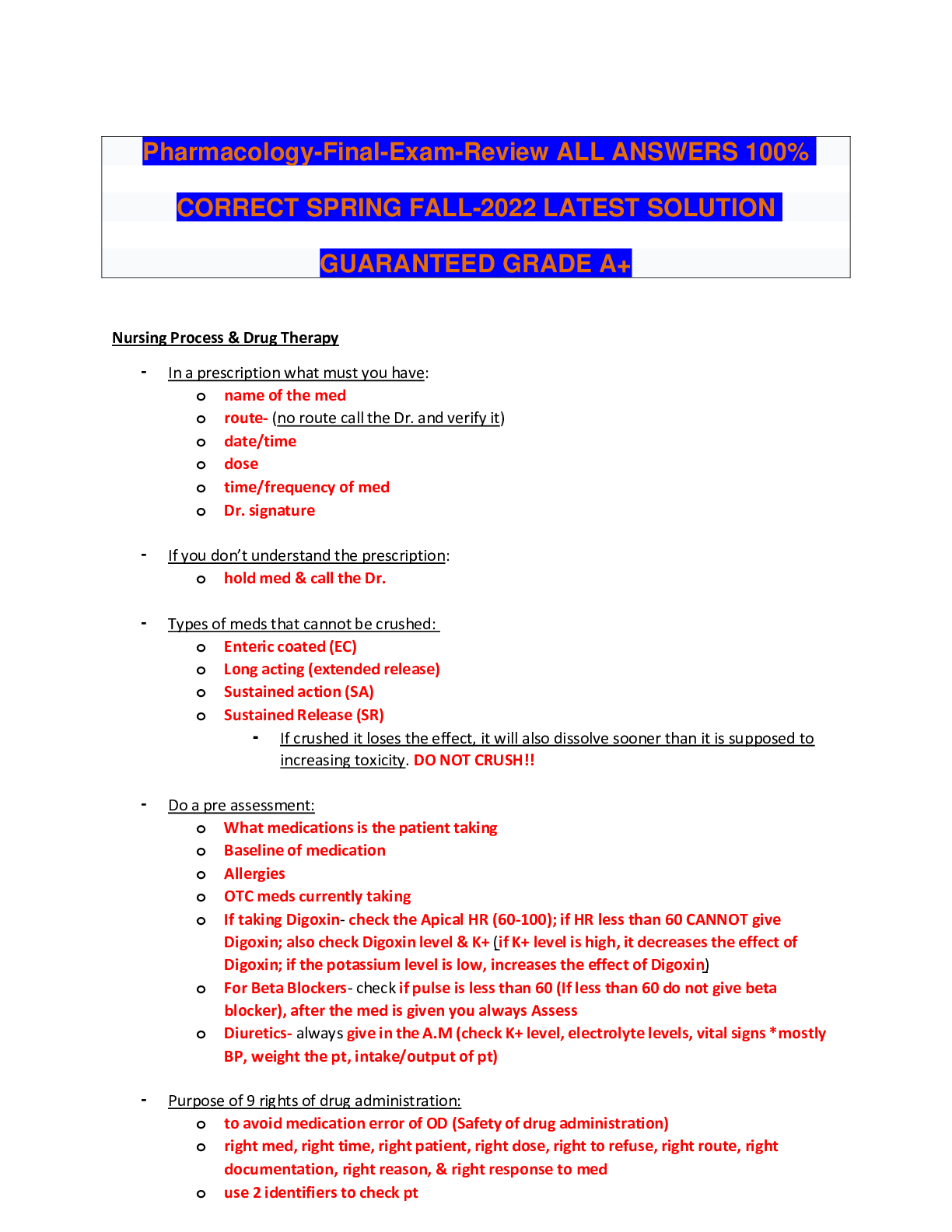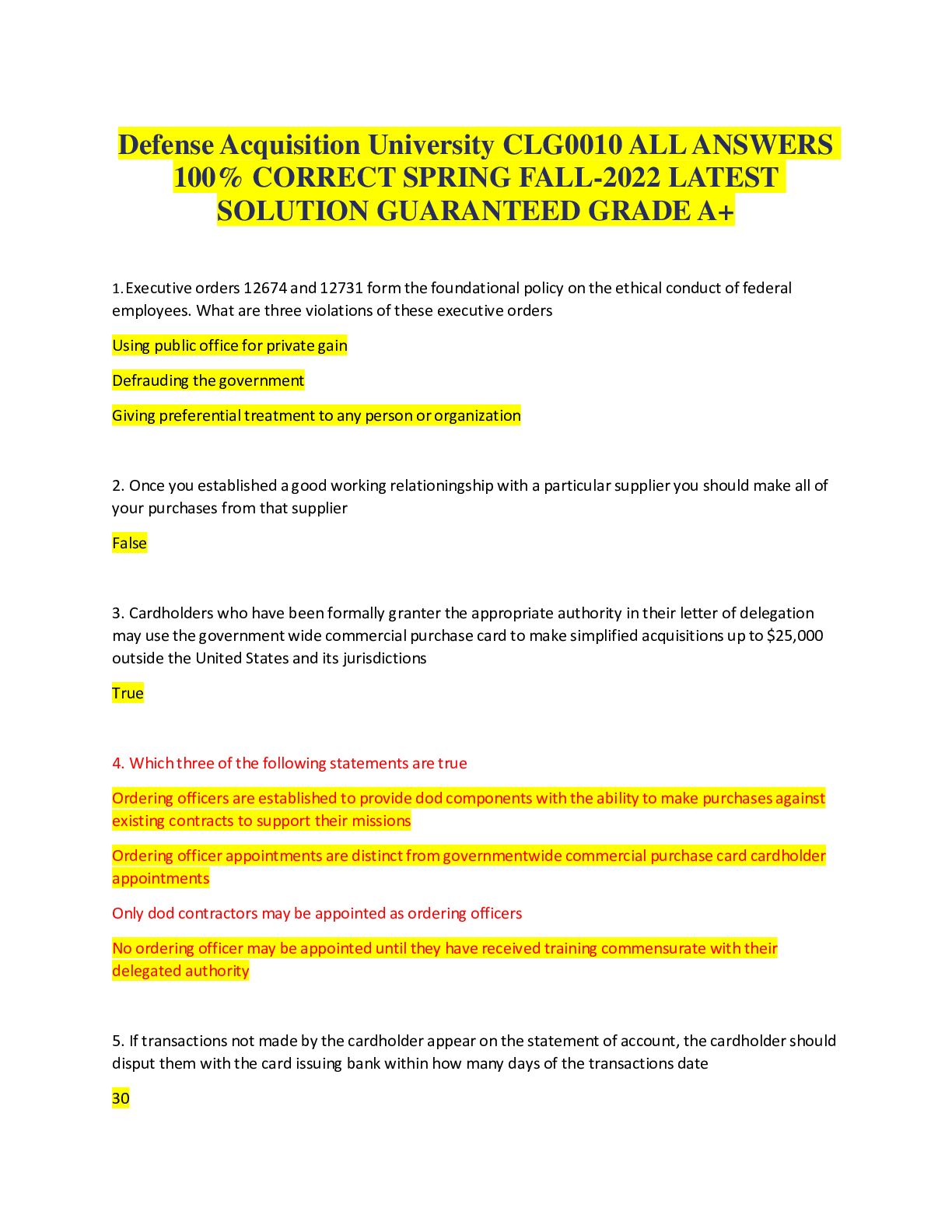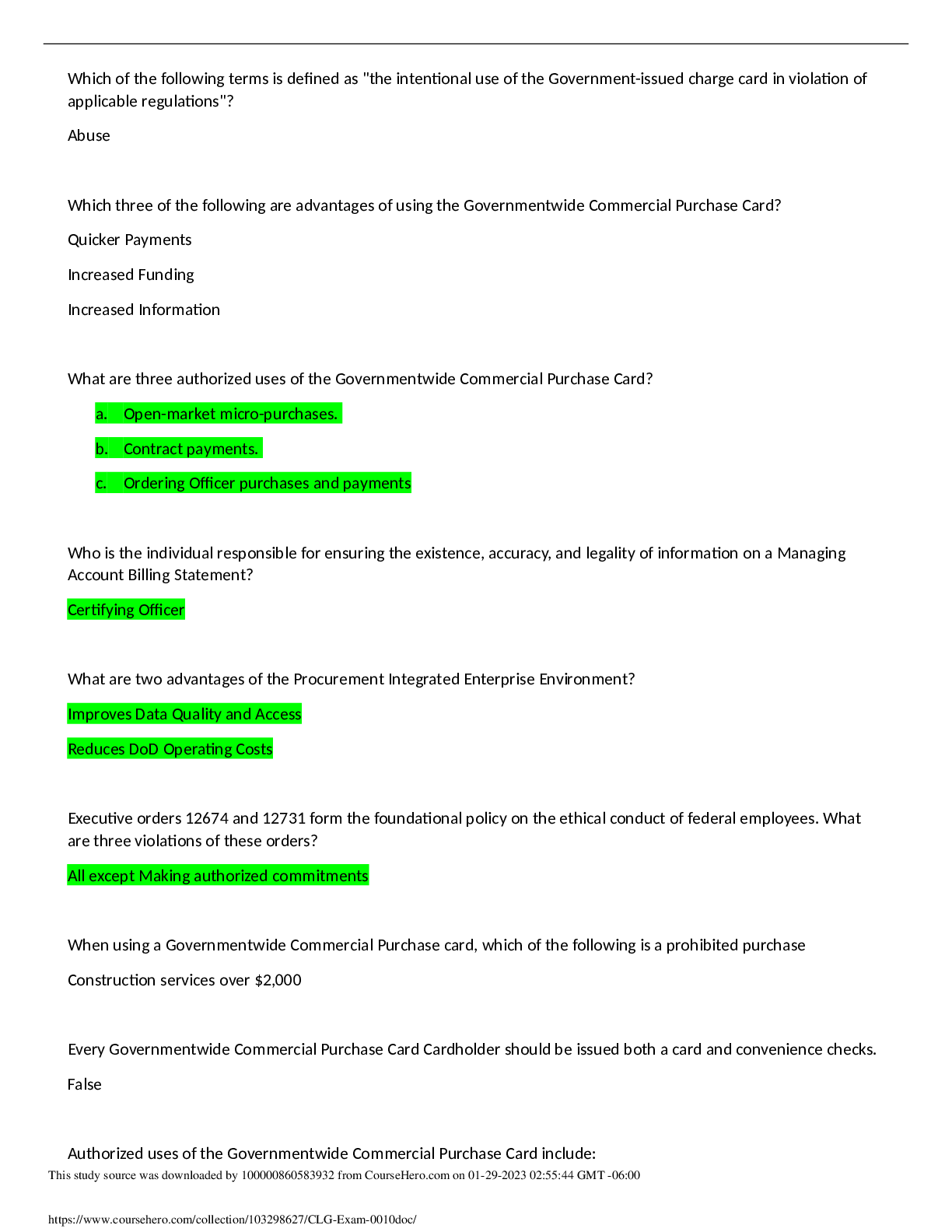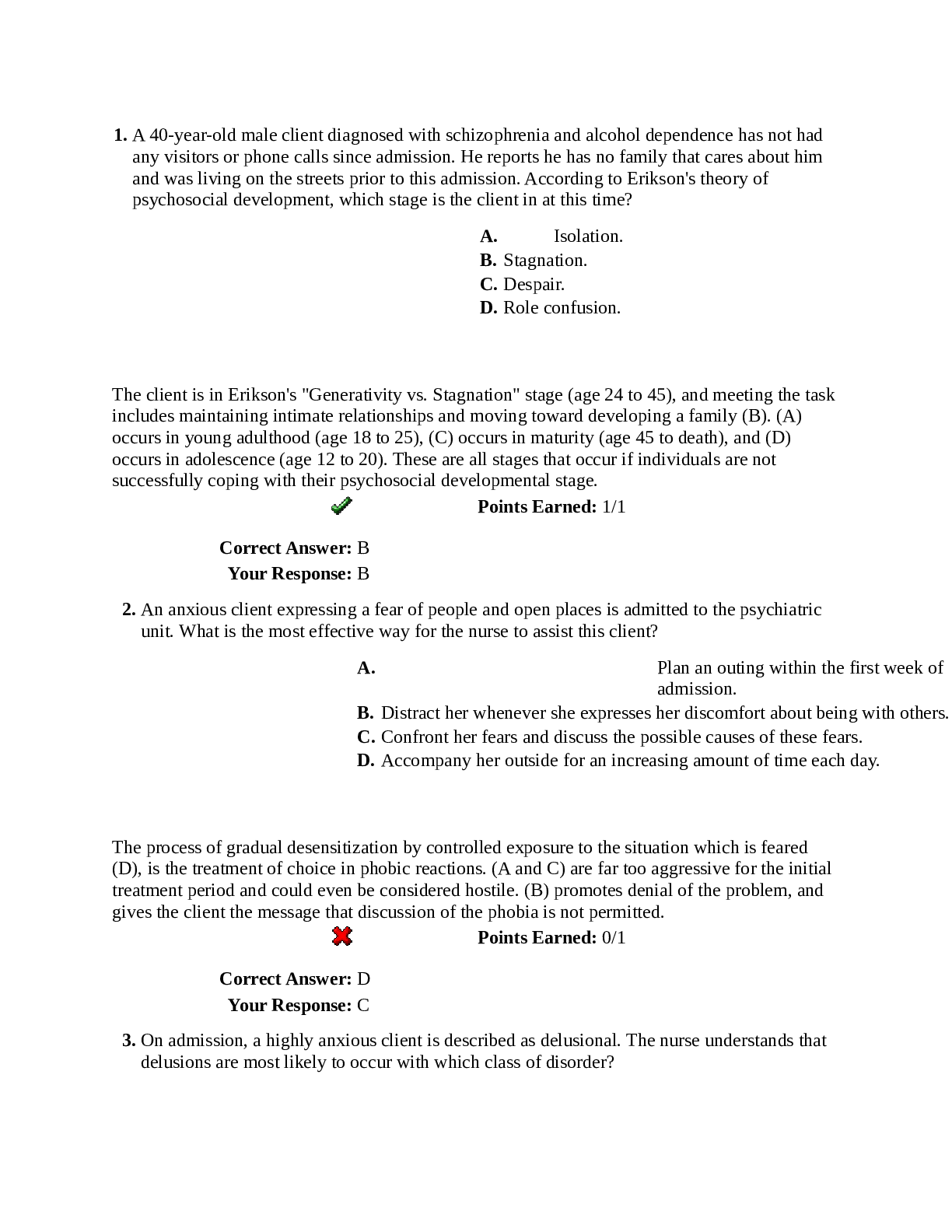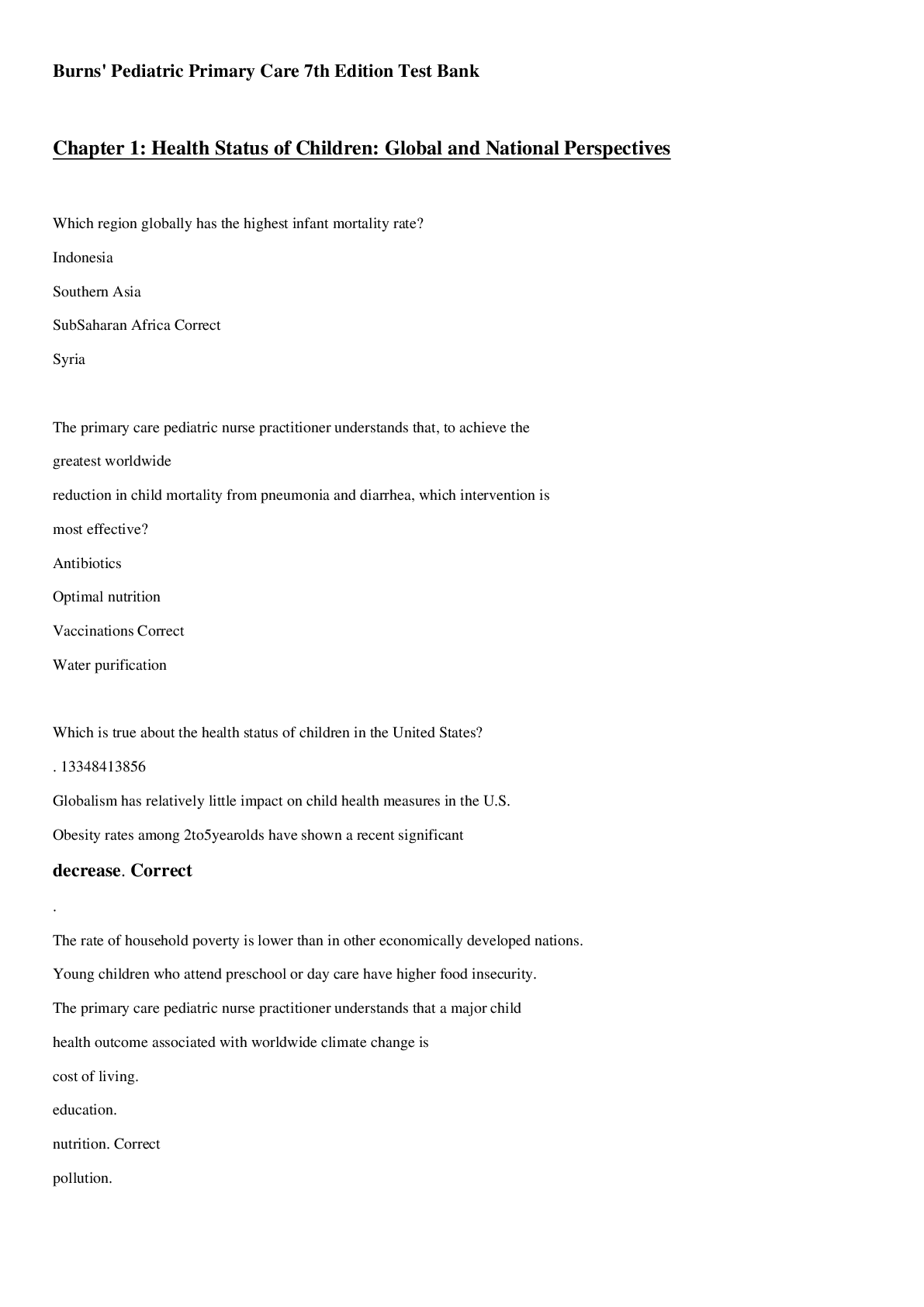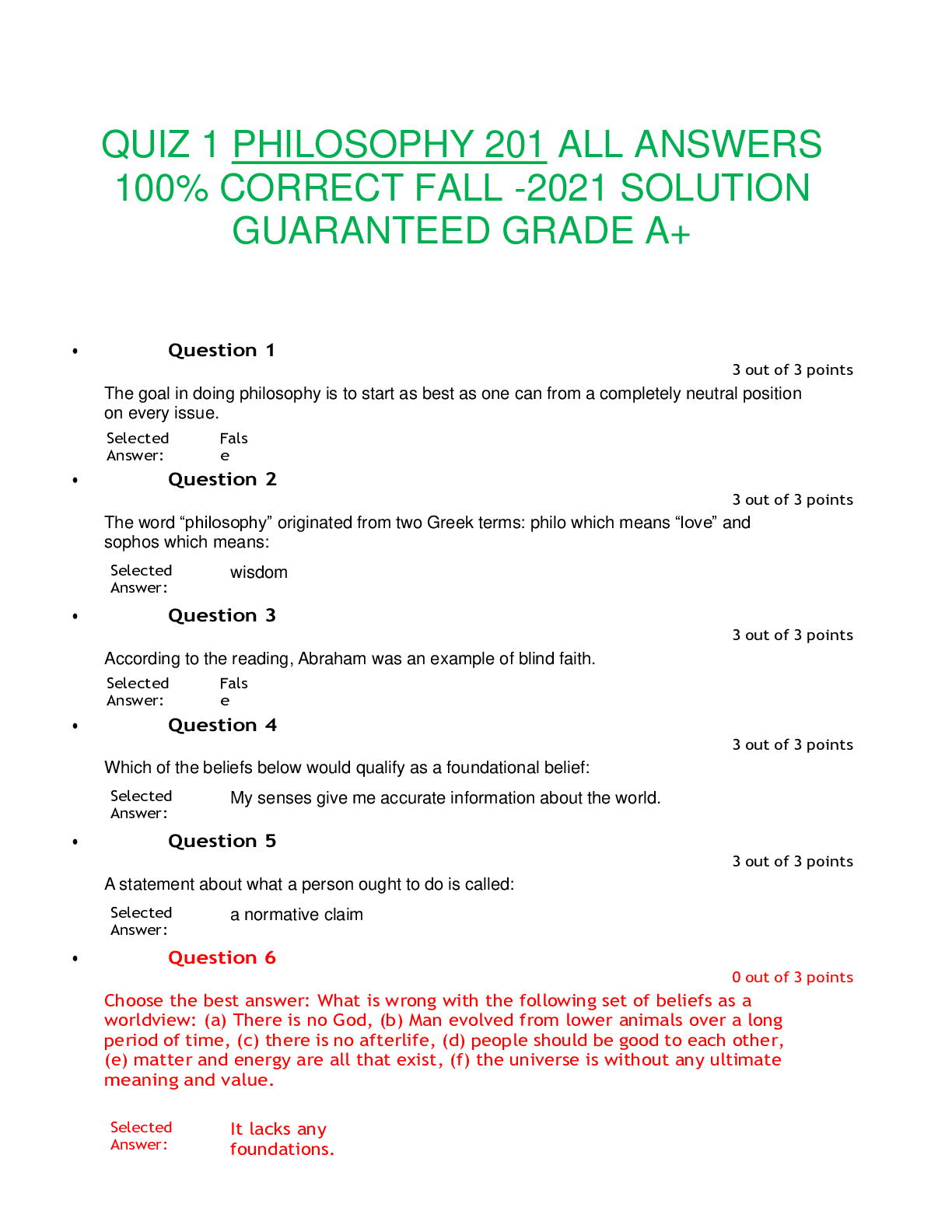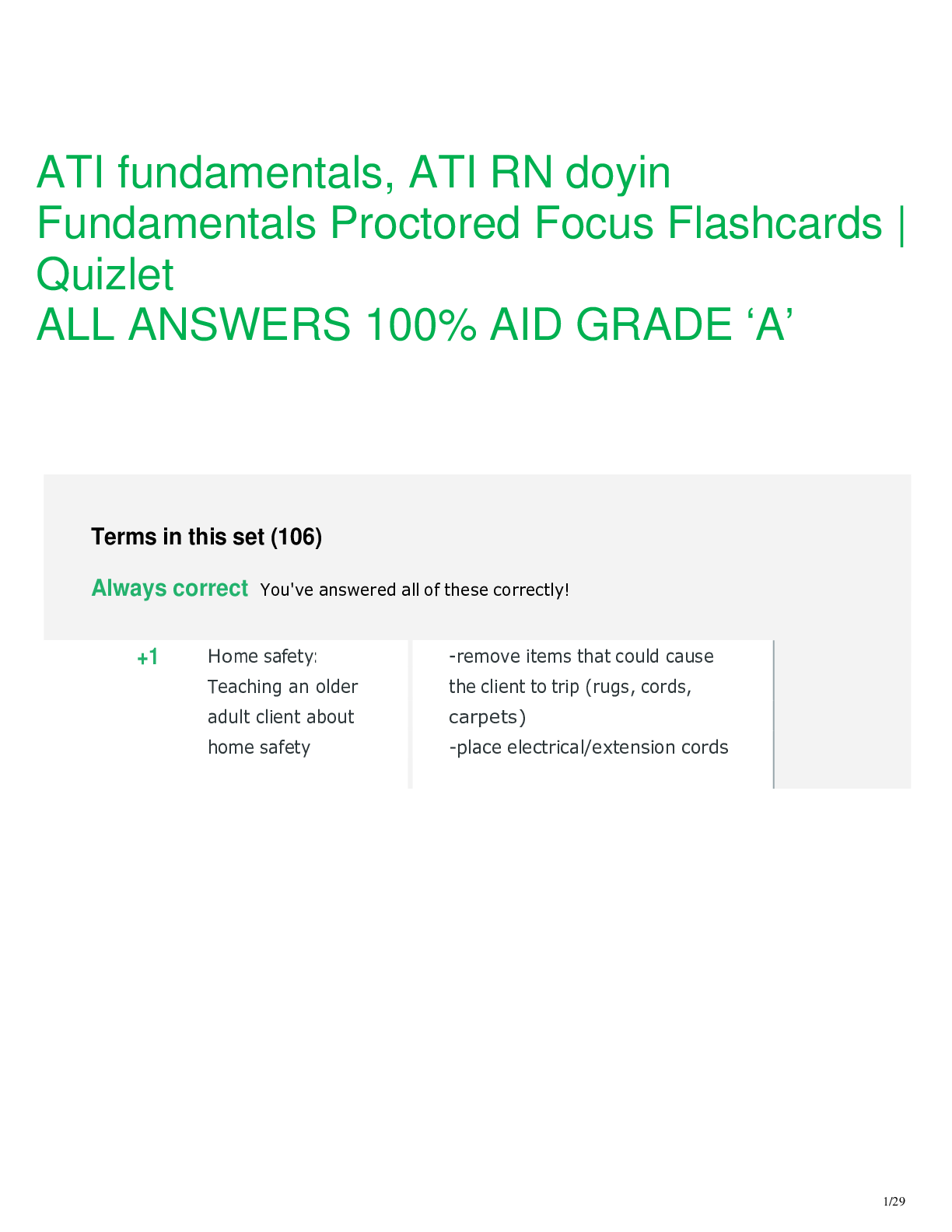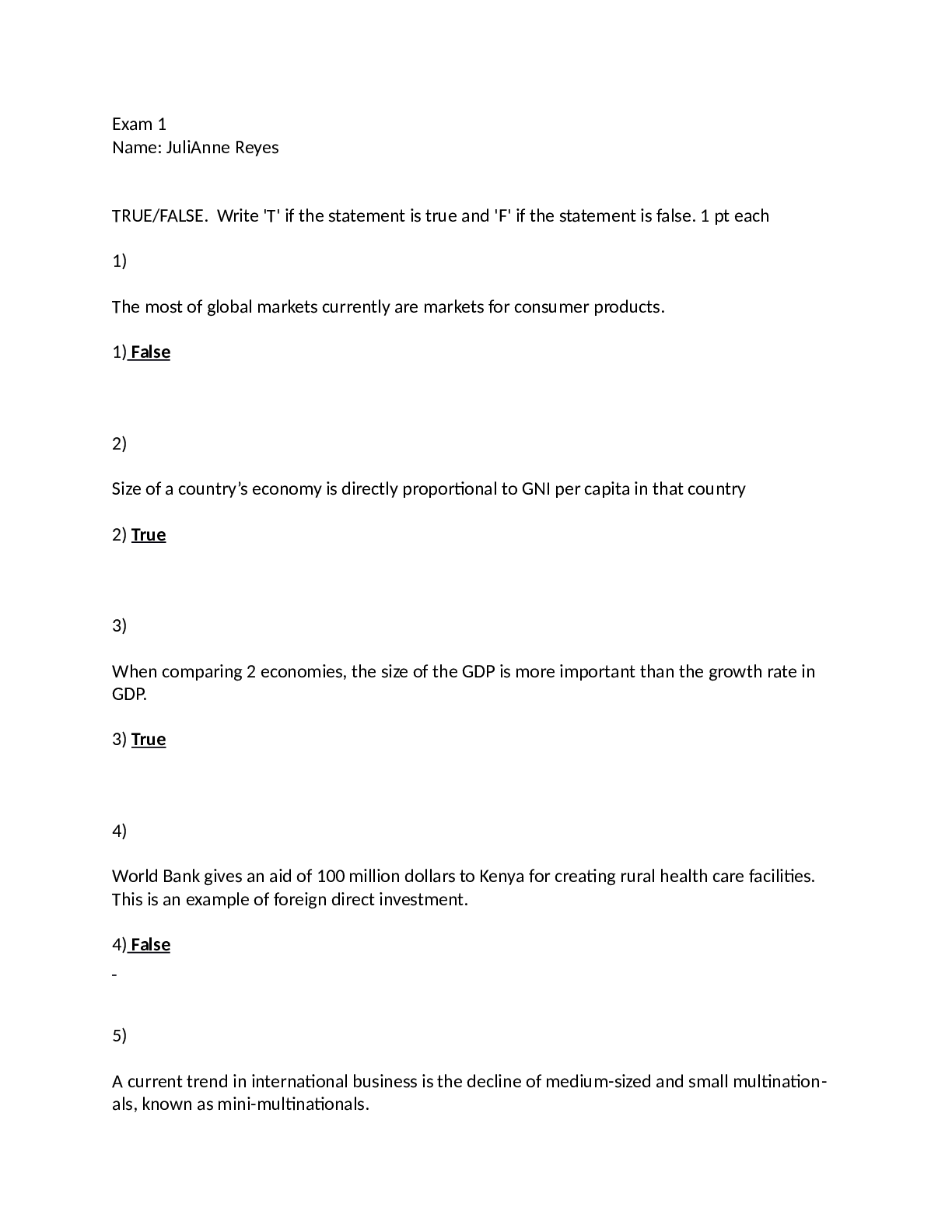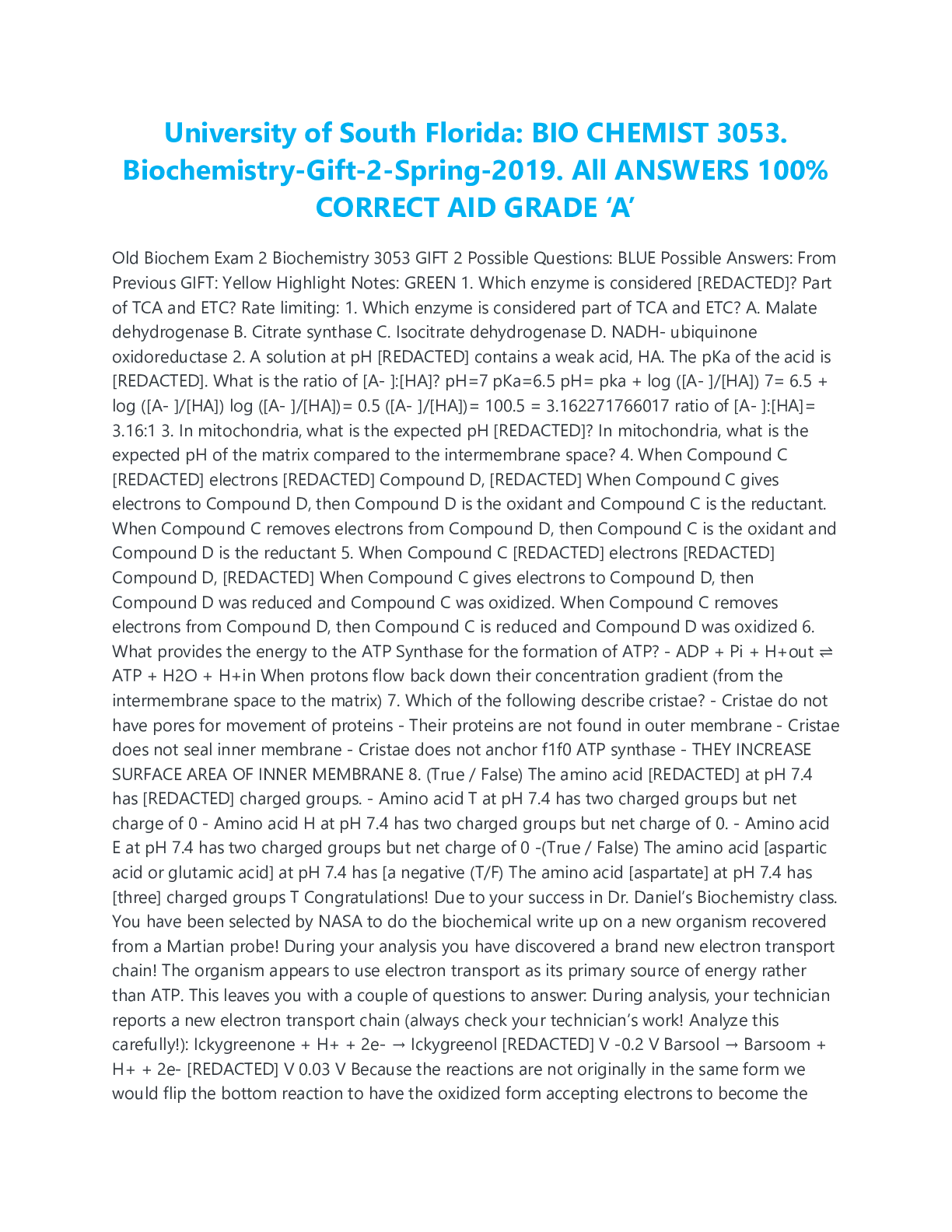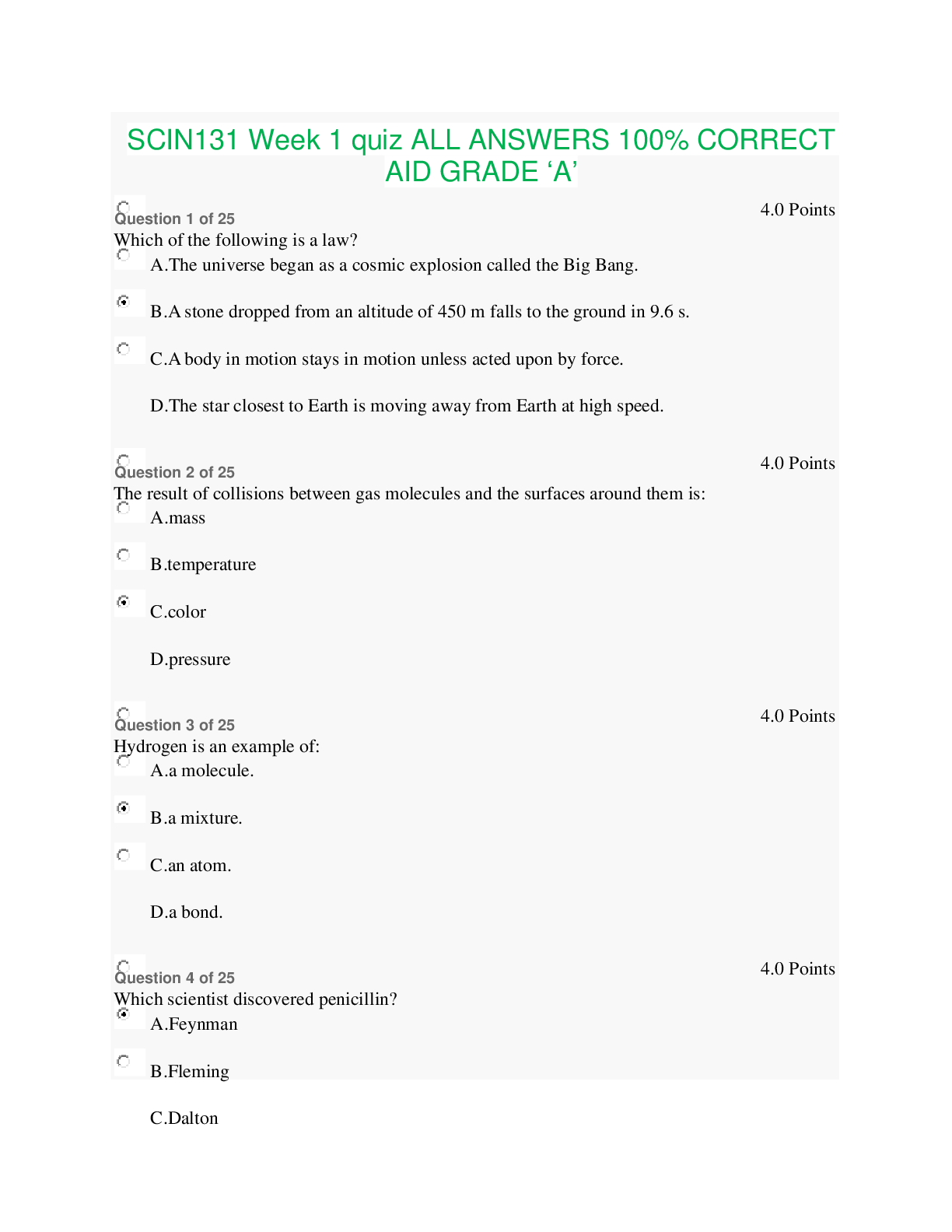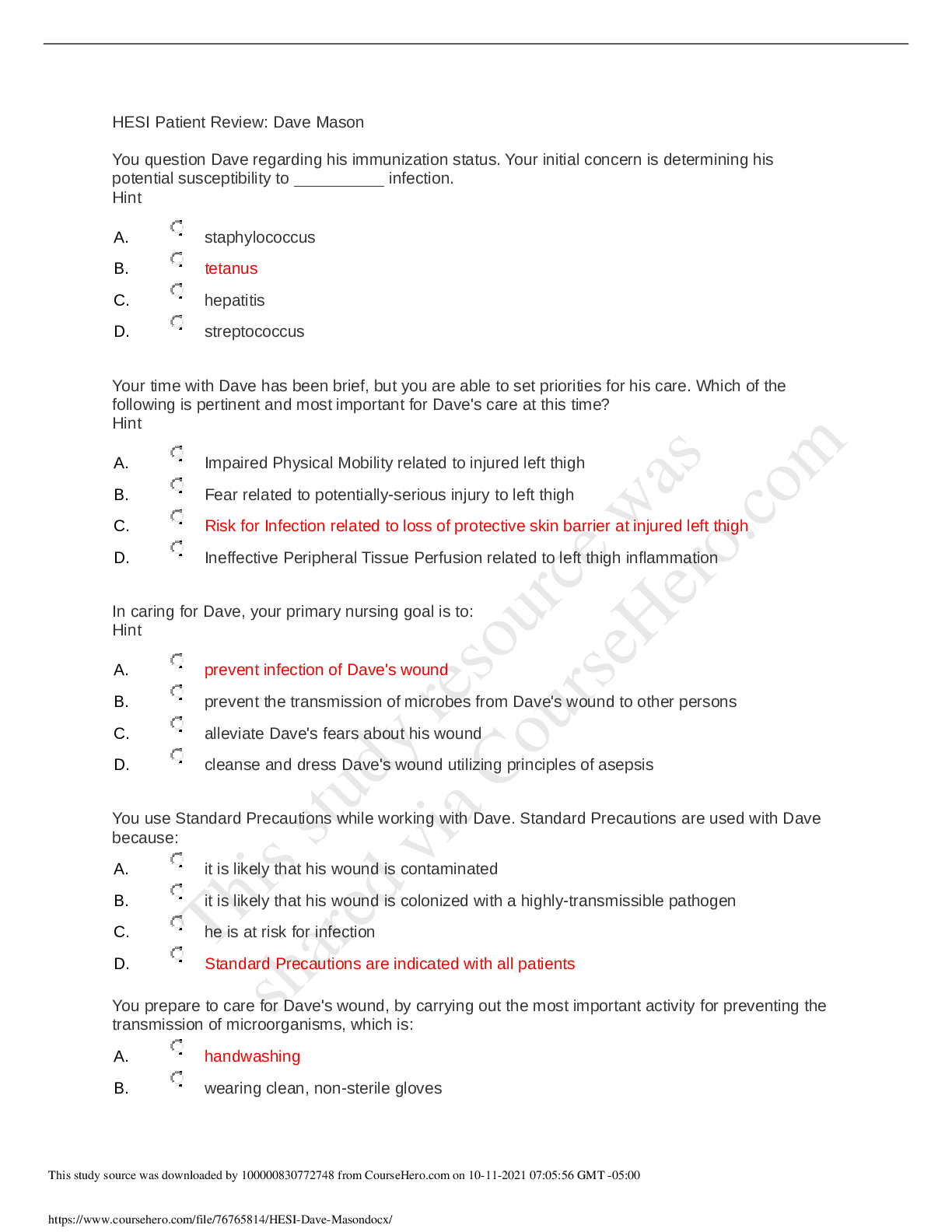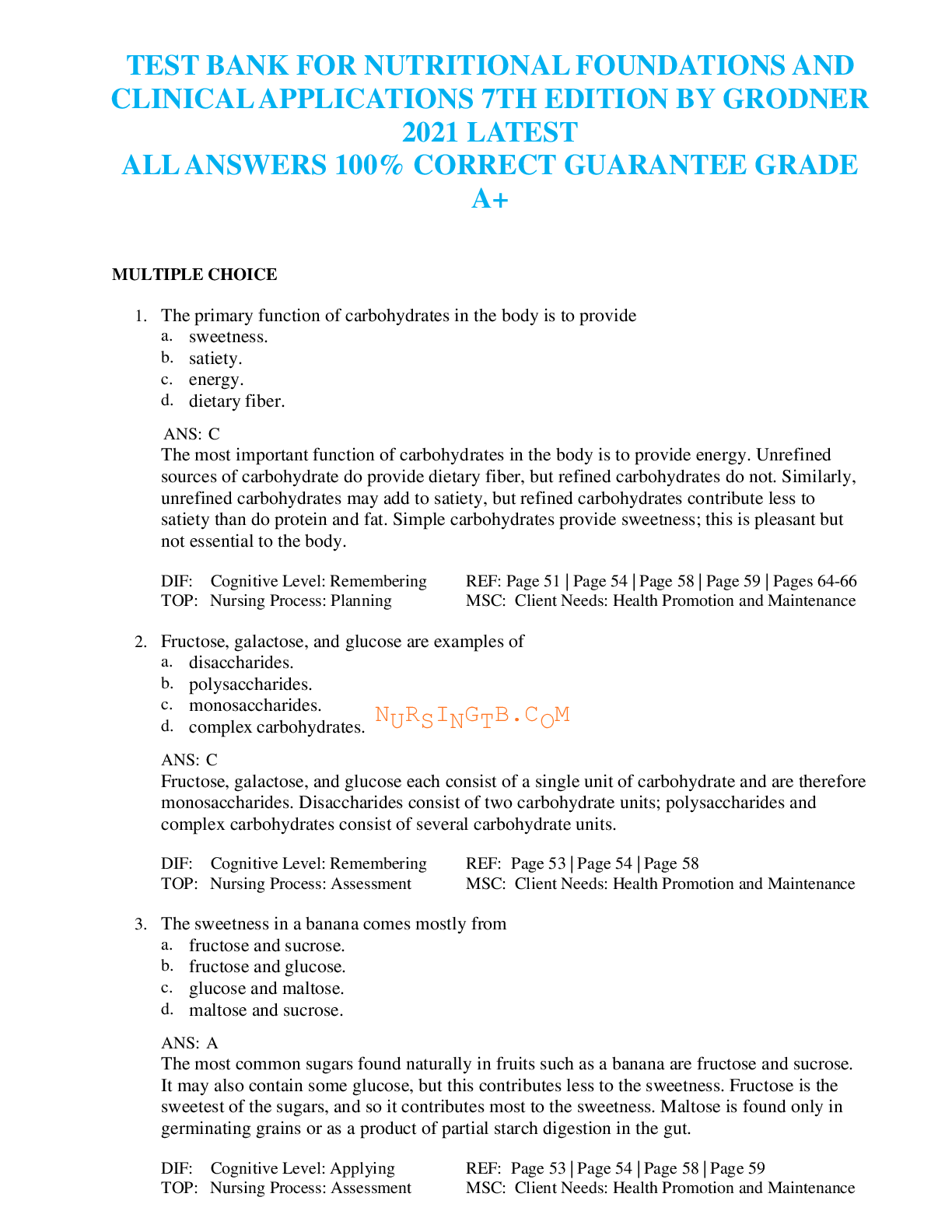Health Care > EXAM REVIEW > Health Assessment - NUR 2092 Exam 1 (Muskus) ALL ANSWERS 100% CORRECT SOLUTION FALL-2021 EDITION AID (All)
Health Assessment - NUR 2092 Exam 1 (Muskus) ALL ANSWERS 100% CORRECT SOLUTION FALL-2021 EDITION AID GRADE A+
Document Content and Description Below
What are the 6 steps of the nursing process? 1. Assessment 2. Diagnosis 3. Outcome 4. Planning 5. Implementation 6. Evaluation Assessment Definition (nursing process) 1. Collect data 2. Use e... vidence-based assessment techniques 3. Document relevant data Diagnosis Definition (nursing process) 1. Compare clinical findings with normal and abnormal variation and developmental events 2. Interpret data-- make & test hypotheses 3. Validate diagnoses 4. Document diagnoses Outcome Identification Definition (nursing process) 1. Identify expected outcomes 2. Individualize to the person 3. Culturally appropriate 4. Realistic and measurable 5. Include a timeline Planning Definition (nursing process) 1. ESTABLISH PRIORITIES 2. Develop Outcomes 3. Set timelines for outcomes 4. IDENTIFY interventions 5. Integrate evidence-based trends and research 6. Document plan of care Implementation Definition (nursing process) 1. Implement in a safe and timely manner 2. Use evidence-based interventions 3. Collaborate with colleagues 4. Use community resources 5. Coordinate care delivery 6. Provide health teaching and health promotion 7. Document implementation and any modifications. Evaluation Definition (nursing process) 1. Progress toward outcomes 2. Conduct systematic, ongoing, criterion-based evaluation. 3. Include patient and significant others 4. Use ongoing assessment to revise diagnoses, outcomes, and plan 5. Distribute results to patient and family Acute pain 1. Is short term and self-limiting, often follows a predictable trajectory, and dissipates after an injury heals. 2. Self-protective purpose; it warns the individual of actual or threatened tissue damage. Chronic Pain 1. Over 6 months in duration 2. Adaptive responses Phantom pain 1. Pain where limb used to exist Malignant pain Vs nonmalignant pain 1. Malignant pain is cancer-related and is caused by tumor cells that cause necrosis or stretching. 2. Nonmalignant pain is often associated with musculoskeletal conditions. Visceral pain Originates from internal organs. Somatic pain and deep somatic pain 1. Somatic pain originates from musculoskeletal tissues or the body surface 2. Deep somatic pain comes from sources such as blood vessels, joints, tendons, muscles, and bone. Referred pain Pain that is felt at a particular site but originates from another location. Nociceptive pain 1. Develops when functioning and intact nerve fibers in CNS are stimulated. 2. They are triggered by events outside nervous system from actual or potential tissue damage. 3. Nociception can be divided into four phases: (1) Transduction: (2) Transmission: the pain impulse moves from the level of the spinal cord to the brain. (3) Perception: signifies the conscious awareness of a painful sensation (4) Modulation: a built-in mechanism that will eventually slow down and stop the processing of a painful stimulus Neuropathic pain 1. Pain caused by a lesion or disease of the somatosensory nervous system. 2. This implies an abnormal processing of pain message from an INJURY to the NERVE FIBERS. 3. This pain is very difficult to treat and assess. Subjective Data Pain is always subjective. What the patient is complaining of; SYMPTOM Objective data What the nurse observes; SIGN Nutritional Status This balance is affected by many factors, including physiologic, psychosocial, developmental, cultural, and economic factors Nutritional Assessment Food intake 24 hour recall Food diary Food frequency Direct observation Anthropometric measurements Swallowing assessment prn Lab tests Pain assessment tools 1. Brief pain inventory: asks the patient to rate the pain within the past 24 hours using graduated scales (0 to 10) with respect to its impact on areas such as mood, walking ability, and sleep 2. McGill Pain Questionnaire: The short-form McGill Pain, asks the patient to rank a list of descriptors in terms of their intensity and to give an overall intensity rating to his or her pain 3. Initial Pain assessment: asks the patient to answer 8 questions concerning location, duration, quality, intensity, and aggravating/relieving factors. 4. Pain rating scales 5. Wong-Baker Faces pain rating scale Pain Assessment Posture/behavior Facial expression Sounds Skin inspection/palpation BP/pulse/respirations Pupil size How to assess domestic violence "Abuse assessment screen" is a tool used by many healthcare providers. Pulse Oximetry Noninvasive Estimate arterial oxygen saturation in blood Normal Resp. Rate for adult 10-20 Normal BP for Adult 120/80 BMI requirements for being underweight, normal weight, overweight, obese. Underweight = 18.5 BMI Normal weight = 18.5- 24.9 BMI Overweight= 25-29.9 BMI Obese= 30+ BMI How to document pulse 0=absent 1+= weak 2+= normal 3+= bounding Definition of Eupnea Normal/good breathing Definition of Apnea Breathing has stopped What does the acronym PQRSTU stand for? P= Precipitating/palliative/provocative, what brings it on? What were you doing when you noticed it? Q= Quality or Quantity, how does it feel, sound? How intense/severe is it? R=Region or Radiation, Where is it? Does it spread anywhere? S= Severity Scale, Scale of 1-10. Is it getting better/worse? T= Timing/ onset. When did it first occur? Duration? How long did it last? Frequency? U= Understand patient's perception of the problem. What do you think it means? Vital Signs Influences Blood Pressure Age Gender Race Diurnal variations Emotions Pain Personal habits Weight Respiratory Rate Exercise and anxiety Heart Rate (Pulse) Exercise, age, gender, anxiety, pain Temperature Diurnal variations - Lowest early AM, [Show More]
Last updated: 2 years ago
Preview 1 out of 21 pages
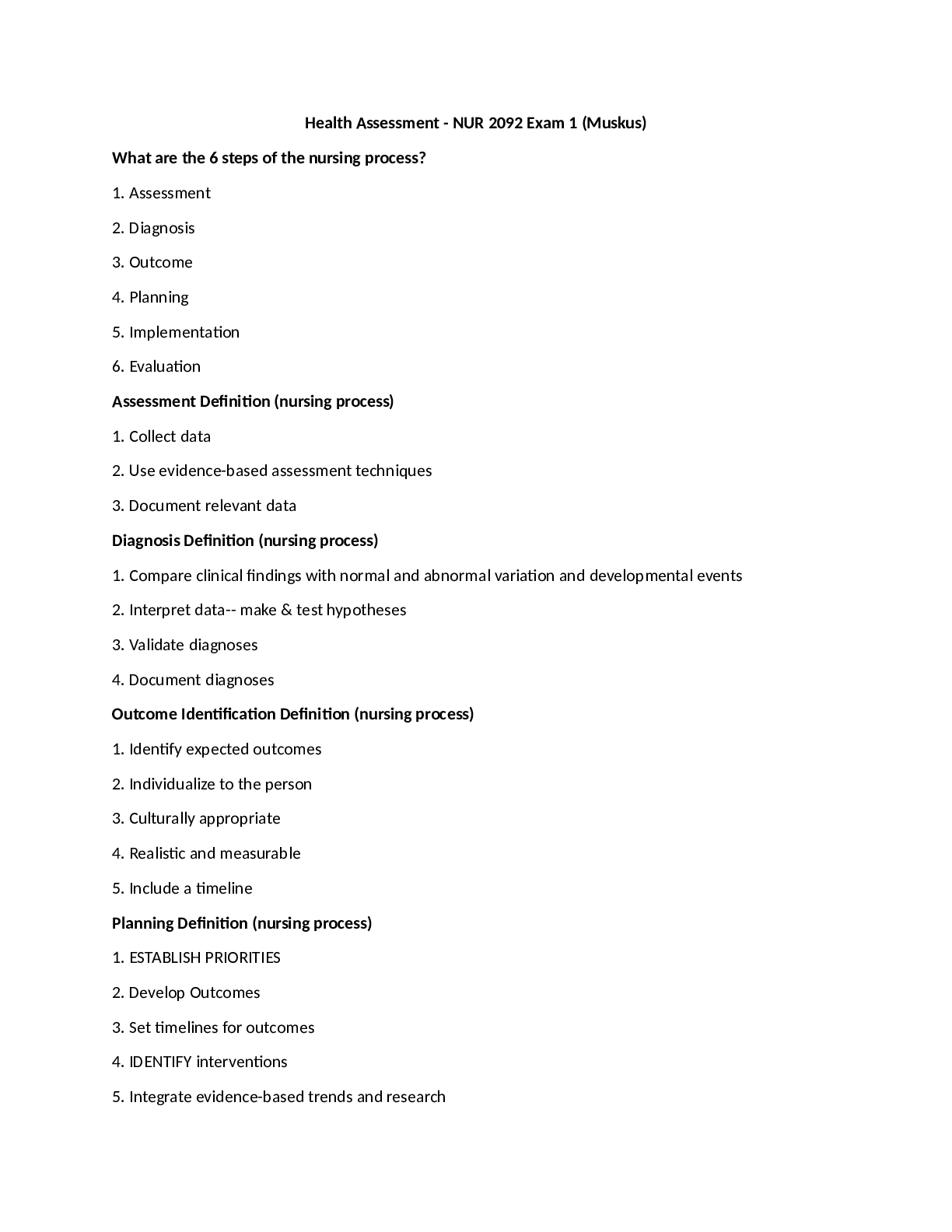
Buy this document to get the full access instantly
Instant Download Access after purchase
Buy NowInstant download
We Accept:

Reviews( 0 )
$13.50
Can't find what you want? Try our AI powered Search
Document information
Connected school, study & course
About the document
Uploaded On
Oct 22, 2021
Number of pages
21
Written in
Additional information
This document has been written for:
Uploaded
Oct 22, 2021
Downloads
0
Views
87

